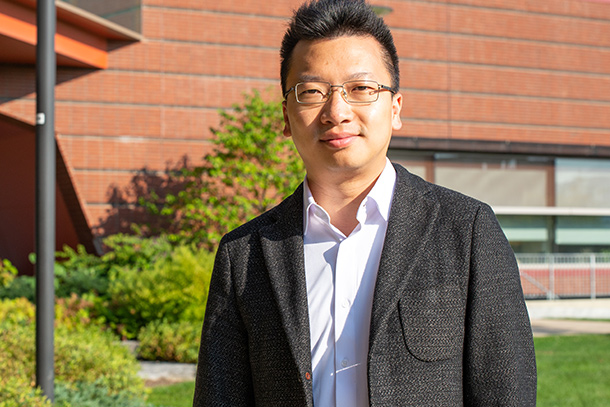
Tak Sing Wong, professor of mechanical engineering and of biomedical engineering in the Penn State College of Engineering, was named a fellow by the American Institute for Medical and Biological Engineering. Credit: Penn State College of Engineering
Wong named fellow of American Institute for Medical and Biological Engineering
Apr 7, 2025
By Mariah Lucas
UNIVERSITY PARK, Pa. — Tak Sing Wong, professor of mechanical engineering and of biomedical engineering in the Penn State College of Engineering and an affiliate of the Materials Research Institute, was named a fellow by the American Institute for Medical and Biological Engineering (AIMBE). He was inducted on March 31 during the AIMBE Annual Event in Arlington, Virginia, alongside 171 others who make up the AIMBE College of Fellows Class of 2025.
“Tak Sing has pioneered the development of biologically inspired repellent materials,” said Mary Frecker, professor and head of the Department of Mechanical Engineering and Riess Chair of Engineering. “His work has had a tremendous impact in the field of antibiofouling and liquid-repellent materials, with applications in biomedical devices, global sanitation and environmental sustainability. His election to AIMBE is truly well-deserved.”
Fellowship in AIMBE is one of the highest professional distinctions accorded to medical and biological engineers, according to AIMBE. The institute recognizes fellows as those who have made outstanding contributions to engineering and medicine research, practice or education, particularly in relation to new and developing fields of technology, medical and biological engineering or bioengineering education.
Wong was nominated and elected by peers and current AIMBE fellows for his “pioneering contributions to bioinspired materials design and the invention of an antibiofouling coating for biodevices and global sanitation applications,” according to AIMBE.
“Over the last 15 years, Tak Sing and his research group have developed a new class of repellent surface coatings known as liquid-infused surfaces, which can repel both liquids and solids and prevent the accumulation of bacteria on bathroom surfaces like toilet bowls,” said Dan Hayes, head of the Department of Biomedical Engineering and Dorothy Foehr Huck and J. Lloyd Huck Chair in Nanotherapeutics and Regenerative Medicine. “It is wonderful to see him gain recognition for this important work, which helps improve health and hygiene and reduces cleaning and maintenance costs globally.”
Wong leads the Laboratory for Nature-Inspired Engineering at Penn State, which aims to “translate nature’s discoveries into advanced materials technologies to improve human life,” according to the lab’s website. Wong’s research focuses on surface and interfacial sciences and micro- and nanomanufacturing, as well as biologically inspired materials design with applications in health, water and environmental sustainability.
"It is a great honor to be recognized by AIMBE for the achievements of our research group, and I am deeply grateful to my students, postdocs and collaborators who have contributed significantly to this journey,” Wong said. “Our coatings enable applications in ultrasensitive detection, diagnostics, microfluidics and medical devices. Commercial products based on our technology can now be found in all 50 U.S. states and over 40 countries around the world.”
Wong cofounded spotLESS Materials Inc. to commercialize his coating technology, where it is now being applied in sanitation, biomedical devices, consumer packaged goods and beyond. He currently holds over 60 issued and pending U.S. and international patents, and about two-thirds of them have been licensed to industrial and medical companies.
Wong was previously elected a fellow of both the American Society of Mechanical Engineers (ASME) and the Royal Society of Chemistry in 2024. His work on bio-inspired materials has been recognized with a number of awards including Penn State’s Faculty Scholar Medal for Outstanding Achievement (2024), the Presidential Early Career Award for Scientists and Engineers (2019), ASME’s Sia Nemat-Nasser Early Career Award (2018), IEEE Nanotechnology Council's Early Career Award in Nanotechnology (2016), the DARPA Young Faculty Award (2014), a U.S. National Science Foundation Early Career Development Award (2014), and MIT Technology Review’s Top 35 Innovators Under 35 (2014).
Wong received his bachelor’s degree in automation and computer-aided engineering from the Chinese University of Hong Kong in 2003 and his doctoral degree in mechanical engineering from UCLA in 2009. Wong conducted postdoctoral research at the Wyss Institute for Biologically Inspired Engineering at Harvard University before joining Penn State as the inaugural holder of the Wormley Family Early Career Professorship in Engineering.

